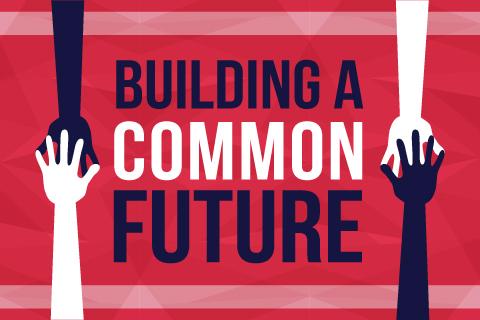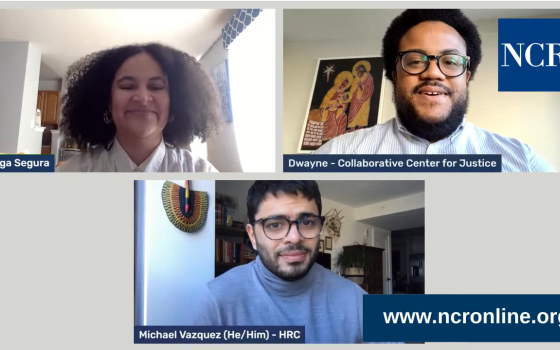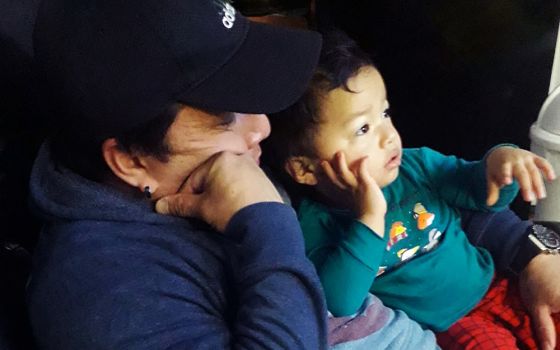President-elect Joe Biden stands with his nominees for his national security team at his transition headquarters in the Queen Theater Nov. 24, 2020, in Wilmington, Delaware. (CNS/Joshua Roberts, Reuters)

(NCR graphic/Toni-Ann Ortiz)
The U.S. Constitution was established, as it explains in its preamble, "to form a more perfect Union, establish Justice, insure domestic Tranquility, provide for the common defence, promote the general Welfare, and secure the Blessings of Liberty to ourselves and our Posterity."
Two hundred and thirty-three years later, Pope Francis echoes that need for the "general Welfare" in his encyclical, Fratelli Tutti. "At a time when everything seems to disintegrate and lose consistency, it is good for us to appeal to the 'solidity' born of the consciousness that we are responsible for the fragility of others as we strive to build a common future," he writes.
Building our common future: It's what the United States, indeed, the entire world needs right now. Doing so involves a fight against the ideological curse that besets America today, the idea that if individuals simply pursue their own interest, defend their own freedom, and ignore or even deny the existence of any "common" good, all boats will rise, the government will shrink as it should, and the people will be free from the shackles of imposed moral orders.
This libertarian vision — articulated by thinkers like Hayek and championed by politicians like Reagan and Thatcher — is not only contrary, root and branch, to Catholic social doctrine, it is the antithesis of that liberalism that shaped the American founding.
This ideology has created a nation where a significant percentage of Americans shun the wearing of masks as an infringement on their personal freedom, despite more than 323,000 deaths in less than a year.
Sun shines through a statue of Christ on a grave marker alongside an American flag June 7, 2018, at St. Mary Catholic Cemetery in Appleton, Wisconsin. (CNS/Bradley Birkholz)
Joe Biden will be inaugurated on Jan. 20, an exact year after the first COVID-19 case was confirmed in the United States. In less than a year, more than 18 million cases have been confirmed in America, millions have lost their jobs, and thousands have pulled from retirement savings. The pandemic has tragically highlighted our nation's inequalities, but it did not create them. As Biden begins his presidency, he faces rising supremacist violence, overcrowded detention centers and prisons, racial inequalities in schools and a crumbling health care system.
COVID-19 has tragically demonstrated why we need a politics that concerns itself again with the common good. Confronting the pandemic by strengthening our nation's health care system, moving ever closer to the day when health care really is a right and not a privilege, is the most obvious area for common good political reform. Tax reform that requires large corporations and wealthy individuals to pay more, targeting the revenue towards universal, national needs like free day care and preschool, is a second. We need policies of inclusion, not exclusion, across all racial, financial, ethnic, educational and gender lines. Obviously, protecting our common home from the threat of climate change is the quintessence of common good politics.
And, in Biden, our nation's second Catholic president, the nation has an incoming president whose biography and political outlook is attuned to the fact that we, as a people, as a nation, must tame our selfish instincts and learn again how to look after one another. He knows we must rebuild an economy that works for stakeholders and not only stockholders; that government exists in part to protect individual liberties and frustrate any putative majoritarian tyranny; and that our Constitution's promotion of a "more perfect union," promoting the "general welfare," and establishing "justice" all speak to the common good, our shared sense of responsibility to one another.
We editors are allergic to any suggestion that ours is a "Christian nation." But that doesn't mean that we, as Catholics, can't give advice to our president-elect.
We have inaugurated a series of essays from prominent Catholic political and cultural leaders on what issues the Biden administration must prioritize in its first 100 days. We have invited writers to offer reflect on issues such as policing, the death penalty, LGBT issues, abortion and education, drawing on Catholic social teaching, papal documents and teachings, and other parts of our tradition. Those columns will begin Jan. 4 at NCRonline.org and continue through and after the inauguration.
Joe Biden's language about the dignity of work, our shared obligations, and the common good — all cornerstones of Catholic social doctrine — suggests a logic of governance that will, we hope, lead to legislation worthy of that human dignity that alone gives moral credibility to any government. In the weeks ahead, we hope the new president will do what he can to unite the country, to rebuild the economy and to inspire all Americans to embrace solidarity to build "a common future."
Advertisement





